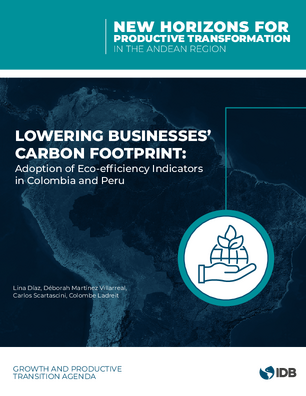Lowering Businesses' Carbon Footprint: Adoption of Eco-efficiency Indicators in Colombia and Peru
Date
Apr 2024
This document provides a guide for conducting behaviorally informed interventions to reduce businesses' carbon footprint. It draws insights from a pilot study within Colombia's textile industry and Peru's plastic industry. The study addresses the critical need for businesses to adapt to the challenges posed by climate change and transition risks, such as the European Union's Carbon Border Adjustment Mechanism (CBAM), which requires significant adaptations from companies in Latin America and the Caribbean to stay competitive. A key component of this study was developing and testing the "Green Tool," designed to assist companies in adopting eco-efficiency indicators (EEIs), which can be used as an input to measuring and lowering companies carbon footprint.
Central to the intervention's success was a preliminary diagnosis stage that pinpointed specific behavioral barriers hindering the reduction of carbon footprints, including present bias and prevailing social norms. By combining a behaviorally informed communications strategy with mentorship, the intervention enhanced the adoption of EEIs among the businesses in the treatment group compared to those in the control group. This pilot study highlights the essential role of targeted interventions, mentorship, and the strategic application of behavioral tools in encouraging sustainable practices within the business sector. Furthermore, this guide demonstrates the effectiveness of behavioral interventions in supporting businesses to transition towards lower carbon footprints, showcasing a path forward in the global effort to combat climate change.
Central to the intervention's success was a preliminary diagnosis stage that pinpointed specific behavioral barriers hindering the reduction of carbon footprints, including present bias and prevailing social norms. By combining a behaviorally informed communications strategy with mentorship, the intervention enhanced the adoption of EEIs among the businesses in the treatment group compared to those in the control group. This pilot study highlights the essential role of targeted interventions, mentorship, and the strategic application of behavioral tools in encouraging sustainable practices within the business sector. Furthermore, this guide demonstrates the effectiveness of behavioral interventions in supporting businesses to transition towards lower carbon footprints, showcasing a path forward in the global effort to combat climate change.
Generative AI enabled





